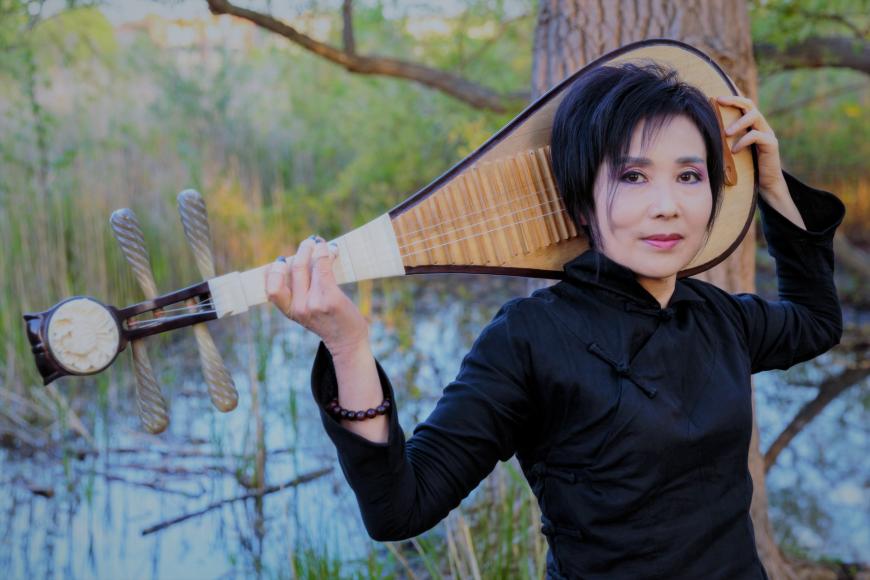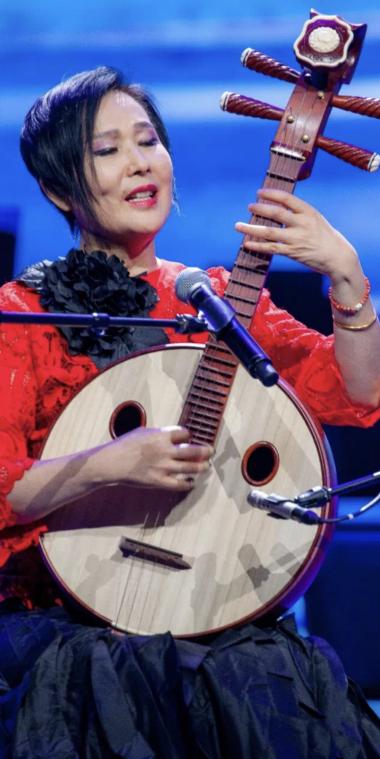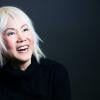
Like most countries, China has its own unique instruments that date back many centuries. One of those is the pipa, an ancient stringed instrument, similar to a Western lute, typically used to play traditional music. And although that is the kind of music she started with, pipa master, singer, and composer Min Xiao-Fen developed a much more expansive vision of what the instrument could do.
Min grew up in China during the Cultural Revolution in a musical family. Her father was a teacher at Nanjing University and a pipa master who taught her to play and to sing. She performed for 10 years with the Nanjing Traditional Music Orchestra, but as China started to open up, she began singing in nightclubs, and in 1992 she moved to the U.S. and became a featured soloist with many orchestras here and abroad.
She also began boldly exploring other genres, including improvisational jazz, performing and recording with many acclaimed musicians and composers, including John Zorn, Wadada Leo Smith (who wrote a concerto just for her), Derek Bailey, Philip Glass, and even pop star Björk.

Venturing further into jazz, Min founded the Blue Pipa Trio with Dean Johnson on bass and Steve Salerno on guitar and they began presenting “From Harlem to Shanghai and Back,” a project that reinvented and mixed some of her own compositions with the music of jazz trumpeter Buck Clayton, Chinese composer Li Jinhui, Count Basie, and Duke Ellington. Clayton is credited with bringing Kansas City Swing to Shanghai in the 1930s and collaborating with Li Jinui, considered the father of Chinese popular music.
That project, along with her album, Mao, Monk and Me, a solo recording that reimagined some of Thelonious Monk’s tunes and Dim Sum, featuring her own improvisational and experimental compositions, received accolades from major newspapers and magazines like The New York Times, The Village Voice, and Jazzizz.
Her latest project, White Lotus, a soundtrack she composed and recorded with jazz guitarist Rez Abbasi for the 1930s Chinese silent film The Goddess, was released on June 25.
I chatted with Min recently from her home in Asheville, North Carolina, about how her life has shaped her unusual career trajectory.
You grew up during the Cultural Revolution in China. What was that like?
I was born into a traditional music family, and even though there were a lot of people suffering when I was a child, I had a really good time. We lived in a place with 12 other family units and every night around 8 o’clock, the music started. A lot of people my age played violin, cello, and piano. Not too many people studied Chinese instruments — they played Western instruments to accompany revolutionary songs because the Cultural Revolution had banned all traditional Chinese music.
Tell me about your experience performing in Chinese night clubs.
In the mid ’80s, nobody wanted to hear traditional music anymore because China had started opening up to all kinds of pop songs from Taiwan, Hong Kong, and America, and this music was just throbbing through China. I heard a singer from Taiwan, Teresa Teng, and she had such a beautiful voice. Having only sung revolutionary songs, I was introduced for the first time to another way to sing a song and I started imitating her. So in the daytime, I went to my orchestra rehearsals, but at night I went to clubs and played guitar and sang Chinese pop music.
Why did you decide to emigrate in 1992 to San Francisco, and what was your experience like there?
After more than 10 years of playing traditional music with the Nanking Traditional Orchestra, we didn’t have any new pieces, so I was a little bit bored. I just felt like I had no motivation anymore. Then a good friend asked me if wanted to come to America. So I quit my job, which was a very big decision, and went to San Francisco, and very soon I was working as a soloist with many modern classical composers and premiered a lot of their pieces. I lived there for almost four years, and during my last year I met Wadada Leo Smith who was the first one to introduce me to the free-jazz world.
Why did you decide to move to New York?
I had performed in New York a couple of times and I just felt fascinated by the city — it was such an exciting place with so much going on. I had a recital at the Knitting Factory and met John Zorn there and he introduced me to many great downtown musicians. We went from club to club, jamming, never knowing who we were going to work with. I was always very careful, since I didn’t know how to improvise — it was totally different than Chinese music. It took me 10 years to finally feel a little bit comfortable with that.
Why did you decide to compose White Lotus?
I became interested in writing music for The Goddess because this movie was the high point in early Chinese cinema. It is so beautiful — the story especially touched me. It’s about a prostitute who is working to raise her child and send him to school, but the money gets stolen by a gangster who acts as her pimp. The connotation of the movie to me is about the struggle and the social inequality of women. When I decided to do this project, I invited Rez Abbasi to join me. He had written a movie score a couple of years ago and we always have a lot of chemistry when we play together.
The music has a lot of unusual types of improvisation. Tell me a little about your process when you wrote it.
I composed a different musical theme for each character, which included Buddhist chanting and a voice with electronic loops for the mother, a simple melody for the son, and some very dark sounds and irregular rhythms for the gangster.
What made you decide to leave New York and move to Asheville, North Carolina?
I left New York because after 25 years, I wanted to live someplace peaceful with a more natural environment. My husband and I visited Asheville in 2019 and fell in love with it, so at the end of January we moved here.
Is there a very active music community in Asheville? Are you performing there?
Yes. There is a lot of bluegrass and country, rock ’n’ roll, and pop, and I was even thinking of joining a bluegrass band because the southeast style of music in China is kind of like bluegrass. I [performed] two concerts [recently] in Asheville. One [was] at a big three-day festival called AsheJam where I played a set of all my compositions and interpretations of Thelonious Monk. Then I [brought] Rex here for a CD release concert for White Lotus at the Orange Peel, a very famous downtown venue. It [was] the first time they invited me to play there. They usually feature rock ’n’ roll and pop, but it is changing. People want to see different cultures now — and I think it is a very good thing.
Do you have any future plans for touring as a soloist again?
We’ve been talking about it, but it’s very hard to plan anything right now. I am just going project by project, but if someone writes a pipa concerto for me that feels like a fit, I will do it.




